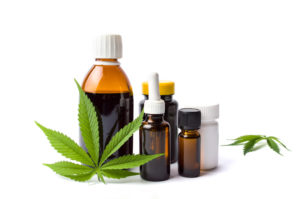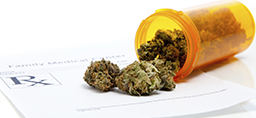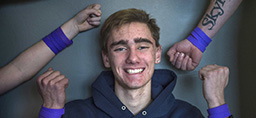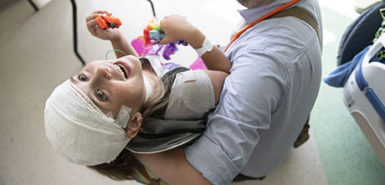
In a regulatory first, the U.S. Food and Drug Administration on Monday said it had approved a drug with an ingredient derived from the marijuana plant.
In a statement, the agency said it had “approved Epidiolex (cannabidiol, or CBD) oral solution for the treatment of seizures associated with two rare and severe forms of epilepsy, Lennox-Gastaut syndrome and Dravet syndrome, in patients 2 years of age and older.”
CBD is derived from the cannabis plant but it does not create any “high” in users. CBD oils and other CBD products have become highly popular across the United States in recent years, for the treatment of pain and other issues.
This is the first time the FDA has approved such a product for any medicinal use, however. In a statement, agency Commissioner Dr. Scott Gottlieb said regulatory approval and oversight is important to safeguard patients.
“Because of the adequate and well-controlled clinical studies that supported this approval, prescribers can have confidence in the drug’s uniform strength and consistent delivery,” he explained.
An advisory panel for the U.S. Food and Drug Administration unanimously recommended in April that Epidiolex be approved for use in the United States.
More approvals to come?
Although CBD oil has become a trendy cure-all, treatment of epilepsy is the only use that has garnered significant scientific evidence supporting its usefulness.
And Gottlieb stressed that numerous marijuana-linked medicines are not necessarily poised for release into the marketplace.
“We’ll continue to support rigorous scientific research on the potential medical uses of marijuana-derived products,” he said. “But, at the same time, we are prepared to take action when we see the illegal marketing of CBD-containing products with serious, unproven medical claims. Marketing unapproved products with uncertain dosages and formulations can keep patients from accessing appropriate, recognized therapies to treat serious and even fatal diseases.”
Epidiolex made headlines in May when a clinical trial found that even low doses of the drug could help patients with epilepsy.
In the trial, patients taking a 10-milligram (mg) daily dose of pharmaceutical-grade cannabidiol experienced nearly as great a reduction in seizures as patients on 20 mg, and with fewer side effects, said the lead researcher of that study, Dr. Orrin Devinsky. He directs NYU Langone’s Comprehensive Epilepsy Center in New York City.
In fact, this was the third clinical trial to show that Epidiolex is useful in treating two rare forms of epilepsy, Lennox-Gastaut syndrome and Dravet syndrome, Devinsky said.
Epidiolex is manufactured by the British firm GW Pharmaceuticals, which funded the clinical trial. It compared two different doses of Epidiolex head-to-head and against an inactive placebo, Devinsky said.
A total of 225 patients suffering from Lennox-Gastaut syndrome were divided into three groups. Those taking 20 mg of Epidiolex a day had 42 percent fewer seizures, on average, compared with 37 percent fewer seizures in the group taking 10 mg of the drug, and a 17 percent reduction in the placebo group.
Bigger dose not necessarily better
But while the 20 mg dose was slightly more effective, it was not the first choice of parents, Devinsky said.
“When parents were asked to rate how their children did best, they actually had a slight preference for the 10 mg dose without knowing what it was,” he added.
That’s because these kids did not experience as many side effects from the cannabidiol, which can include tiredness, decreased appetite, diarrhea and signs of possible liver damage, Devinsky explained.
“They got the vast majority of the benefits with fewer of the side effects,” he said.
The study also showed that Epidiolex is a safe treatment, with only seven patients dropping out of the trial due to side effects—six from the 20 mg group and one from the 10 mg group.
“Compared to other drugs used to treat epilepsy, I think Epidiolex, which is 99 percent pure cannabidiol, has a better side-effect profile than many of the available drugs,” Devinsky said.
Still, the FDA noted in its approval statement that side effects could occur, such as sleepiness, lethargy, poor appetite and infections, among others. And like other drugs that treat epilepsy, Epidiolex will come with a special warning that use may be tied to a higher odds of depression, aggression and suicidal thoughts.
Best for severe cases
According to Angel Hernandez, MD, division chief of pediatric neuroscience at Spectrum Health Helen DeVos Children’s Hospital, these results prove that pharmaceutical-grade CBD helps suppress seizures and “increases our options to treat many of these patients with very, very difficult-to-control epilepsies.”
“We’re talking about types of epilepsy that are extremely difficult to treat with medication,” he said. “Most of these children and adults do not respond to normal pharmacological treatment.”
No one is exactly sure why CBD has this beneficial effect, both Drs. Devinsky and Hernandez said. It appears to work on receptors that alter brain chemistry in a way that reduces the chances of a seizure.
The doctors noted that these effects were seen in patients taking a highly refined form of CBD produced by a drug maker. It’s not known whether patients in states where medical marijuana is legal would see the same effects in CBD oil produced by small companies with no federal oversight.
It’s also not clear whether CBD would help people with more common forms of epilepsy. Devinsky said small clinical trials have so far found no benefit in people with focal epilepsy, where seizures start on one side of the brain.
“I think we need more studies,” Devinsky said. “It’s not been investigated in generalized epilepsy, and I think we need a larger study in focal epilepsy.”
The findings were published online the New England Journal of Medicine.
 /a>
/a>
 /a>
/a>
 /a>
/a>
I was grateful to have been transferred to Butterworth from St. Johns last week for Catamenial seizures. Few doctors I’ve seen in the past 4 years had even heard of CE, so to be in a unit where every dr and nurse knew of this condition was so comforting. And along with their knowledge, the staff were all professional and comforting. Great job everyone.